Trump's Transgender Sports Ban Faces Legal Challenge From Minnesota AG

Table of Contents
The Transgender Sports Ban: A Summary
The Trump administration's executive order, issued in 2020, effectively banned transgender women from participating in women's sports at the school and collegiate levels. The justification for this ban centered on arguments of fairness and the purported biological differences between cisgender women and transgender women. Proponents argued that transgender women possess a physical advantage due to their male puberty, potentially undermining fair competition.
- Specifics of the ban's application: The ban primarily targeted federally funded schools and colleges, significantly impacting athletic opportunities for transgender students.
- Impact on transgender athletes: The ban caused widespread emotional distress and limited opportunities for transgender athletes to participate in sports, impacting their physical and mental well-being.
- Initial reactions and controversies: The ban sparked immediate and intense backlash from LGBTQ+ rights organizations, athletes, and legal experts, who condemned it as discriminatory and harmful.
Minnesota Attorney General's Legal Challenge
Minnesota's Attorney General has launched a robust legal challenge against the transgender sports ban, arguing that it violates Title IX, which prohibits sex-based discrimination in federally funded education programs, and the Equal Protection Clause of the Fourteenth Amendment. The AG contends that the ban unfairly targets transgender individuals and denies them equal opportunities based on their gender identity.
- Key legal precedents: The lawsuit cites several legal precedents that protect the rights of transgender individuals against discrimination.
- Potential legal strategies: The AG's legal strategy likely involves demonstrating that the ban lacks a rational basis and that the purported benefits of the ban (maintaining fairness in women's sports) do not outweigh the significant harms inflicted upon transgender athletes.
- Expected timeline and potential outcomes: The legal proceedings are expected to be lengthy, with potential appeals to higher courts. A successful challenge could lead to the nationwide overturning of the ban and set a significant legal precedent.
Arguments for and Against the Ban
The debate surrounding the transgender sports ban is deeply polarized.
- Pro-ban arguments: Supporters often focus on concerns about competitive fairness, arguing that biological differences give transgender women an unfair advantage over cisgender women, potentially undermining the integrity of women's sports.
- Anti-ban arguments: Opponents emphasize the importance of inclusivity and the discriminatory nature of the ban. They argue that excluding transgender women violates their fundamental rights and perpetuates harmful stereotypes. They often cite the lack of conclusive scientific evidence supporting the claim of a significant competitive advantage.
- Scientific studies and expert opinions: Research on the topic remains limited and inconclusive, making it challenging to definitively establish a clear competitive advantage for transgender women in all sports. Expert opinions are also divided, further fueling the debate.
National Implications of the Legal Challenge
The outcome of Minnesota's legal challenge carries significant national implications. Several states have enacted similar laws restricting transgender athletes' participation.
- States with similar bans or policies: Numerous states have implemented laws or policies restricting transgender athletes' participation in school sports, creating a patchwork of regulations across the country.
- Potential for nationwide legal precedent: A favorable ruling for Minnesota could trigger legal challenges to similar state laws, potentially leading to a nationwide reconsideration of policies restricting the participation of transgender athletes.
- Long-term effects on participation: The resolution of this legal battle will significantly impact the ability of transgender individuals to participate fully and inclusively in sports.
The Ongoing Debate and Future of Transgender Athletes in Sports
The debate surrounding transgender athletes' participation in sports is complex and multifaceted. It involves discussions on fairness, inclusion, and the rights of all athletes.
- Discussions about hormone level regulations: Some propose stricter hormone level regulations as a potential compromise, aiming to balance inclusivity with concerns about competitive fairness.
- Proposals for alternative competitive structures: Alternatives such as separate categories for transgender athletes or specialized leagues are also being explored.
- The role of sports organizations: National and international sports organizations are grappling with developing policies that ensure both fairness and inclusion for all athletes.
Conclusion
The Minnesota Attorney General's legal challenge against the Trump-era transgender sports ban raises crucial questions about fairness, inclusion, and the rights of transgender athletes. The potential for a nationwide legal precedent underscores the importance of this case. The long-term impact on the participation of transgender individuals in sports depends heavily on the outcome of this legal battle. Stay informed about the developments in this crucial legal battle regarding the transgender sports ban and its impact on the future of inclusive sports participation. Continue to engage in respectful and informed discussions surrounding the complex issues involved in the transgender sports ban debate.

Featured Posts
-
 Zagonetka Tarantina Film S Travoltom Koji Nikada Nije Pogledao
Apr 24, 2025
Zagonetka Tarantina Film S Travoltom Koji Nikada Nije Pogledao
Apr 24, 2025 -
 Saudi Arabia And India To Build Two Joint Oil Refineries
Apr 24, 2025
Saudi Arabia And India To Build Two Joint Oil Refineries
Apr 24, 2025 -
 Ella Bleu Travolta Zapanjujuca Ljepota Kceri Johna Travolte
Apr 24, 2025
Ella Bleu Travolta Zapanjujuca Ljepota Kceri Johna Travolte
Apr 24, 2025 -
 Alterya Acquired By Chainalysis A Strategic Move In Blockchain And Ai
Apr 24, 2025
Alterya Acquired By Chainalysis A Strategic Move In Blockchain And Ai
Apr 24, 2025 -
 Steffy And Liams Heart To Heart Finns Warning The Bold And The Beautiful Spoilers For Thursday February 20th
Apr 24, 2025
Steffy And Liams Heart To Heart Finns Warning The Bold And The Beautiful Spoilers For Thursday February 20th
Apr 24, 2025
